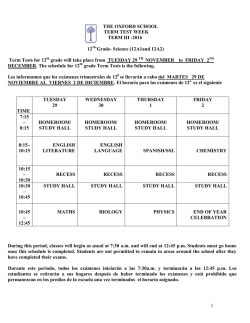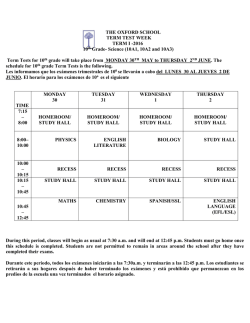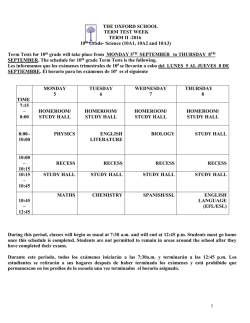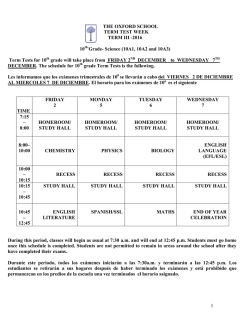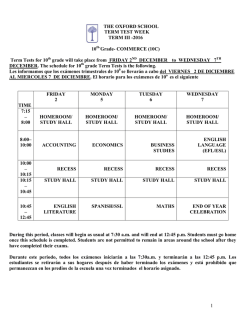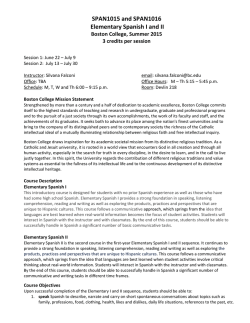
9 TH GRADE TEMARIOS DE CONVOCATORIA 9º GRADO 2016
THE OXFORD SCHOOL REMEDIALS – 9 TH GRADE TEMARIOS DE CONVOCATORIA 9º GRADO 2016 Remedial examinations can only be sat by students who have failed in NO MORE THAN THREE SUBJECTS. Students eligible to sit remedial examinations will have to attend The Annexe on Tuesday 6th December and Wednesday 7th December, 2016. On those days, students must register at The Annexe by 8.00 a.m., dressed in full School uniform. TUESDAY 6TH DECEMBER 08.00 -10.00 a.m. SPANISH 10.15 – 12.15 p.m. ENGLISH LANGUAGE/ HISTORIA /BIOLOGY 1.15 p.m.- 3.15 p.m FRENCH/ SCIENCE/PHYSICS/ACCOUNTING WEDNESDAY 7TH DECEMBER 08.00 -10.00 a.m. MATHS 10.15 – 12.15 p.m. ENGLISH LITERATURE/GEOGRAFIA /CIVICA/BUSINESS STUDIES 1.15 p.m.- 3.15 p.m MUSIC/CHEMISTRY/ECONOMICS 1 GEOGRAFIA 1. Lección 1: El continente Europeo (de la página 29 a la página 41). 2. Bloque temático 2 : Europa, Asia, África, Oceanía y las regiones polares: sus recursos naturales e importancia ( de la página 114 a la pagina 159) 3. Bloque Temático 4: La geografía política de Europa, Asia, África, Oceanía y regiones polares en bloques económicos. (de la página 230 a la pagina 261) HISTORIA 1. Tema 2: Surgimiento de las primeras civilizaciones (páginas 39 - 64) 2. Lección 6: Las aportaciones culturales de los Persas, Fenicios y Hebreos (de la página 90 – 124) 3. Área 2: Las civilizaciones clásicas occidentales: su organización política y social (paginas 133 – 166). 4. Lección 22 Generalidades de la Edad Media (paginas 218 -244) 5. Características del feudalismo en el orden económico, social y político (de la página 245 a la pagina 274). Civica 1. Área 1 : La Sociedad, La Familia, La Educación en Europa y en el Estado Democrático (de la página 13 a la página 42) 2. Área 2: Las Garantías constitucionales deberes y derechos sociales e individuales (de la página 68 a la página 95) 3. Tema 4: Derechos y deberes políticos como futuros ciudadanos (de la pagina 108 a la pagina 125). 4. Tema 5: Formas de Gobierno de los países europeos asiáticos, africanos (de la pagina (de la pagina 126 a la pagina 158) 2 SPANISH TEMARIO DE ESPAÑOL - CONVOCATORIA-2016 NOVENO GRADO SFL Profesoras: Maritza Valencia, Edilma Maure y Kattie Castillo Literatura: Comprensión lectora y redacción de ensayo literario 1. García Lorca, Bodas de Sangre. Biografía, contexto histórico, literario y geográfico Literatura contemporánea y Generación del 27 La tragedia y estructura Personajes, ambiente, estilo, simbologías La matriz actancial Narrador y punto de vista 2. Ave sin Nido, Clorinda Matto de Turner Biografía Contexto histórico literario y social Indigenismo Argumento, temática, personajes Simbologías y recursos literarios Estructura (interna y externa) 3. Biagioni, Amelia. Poesía Completa (Adriana Hidalgo Editora). (Los cinco (5) poemas estudiados) Poesía de vanguardia Biografía y contexto histórico literario y geográfico Análisis de fondo y forma Recursos literarios, simbología, temática. LENGUAJE: Paper 3: Directed Writing and Composition 0502/03 (core and extended). 1. Escritura dirigida: comprensión lectora y redacción de cartas, artículos, blog, texto dialogado. 2. Tipos de textos según su estructura: Narrativos y Descriptivos. Texto descriptivo. Pág. 106 Texto narrativo. Pág. 108 Temas de aplicación. Libro de Destrezas y habilidades 9º 1. 2. 3. 4. 5. 6. Ortografía general Signos de puntuación. Pág. 62, 63, 64, 65 y 66 Casos especiales de acentuación. Pág. 40 El párrafo y sus características. Pág. 70 y 71 Cualidades del texto. Pág. 70 Estructura del ensayo literario, el tema debe estar en sus apuntes del cuaderno. 3 NOVENO GRADO SSL 9° SSL. Profesora Marina Markou LENGUAJE: PAPEL 2 y 4. Comprensión lectora y redacción. Cartas Blogs (pág. 228) Artículos Diario Personal (pág. 230) Texto Narrativo (pág.108) Texto Argumentativo (pág. 204) Comprensión lectora de textos no literarios LITERATURA. COMPRENSIÓN LECTORA Y REDACCIÓN DE ENSAYOS 1. AVE SIN NIDO, CLORINDA MATTO Biografía y contexto histórico literario y geográfico Indigenismo Argumento, temática y personajes 2. PEQUEÑO TEATRO, ANA MARÍA MATUTE Biografía Contexto histórico literario y social Argumento, temática y personajes 3. BODAS DE SANGRE, FEDERICO GARCÍA LORCA Biografía Contexto histórico literario y geográfico Técnica teatral Argumento, temática, personajes y simbología TEMAS ADICIONALES: LIBRO DE DESTREZAS Y HABILIDADES. SANTILLANA. 9º 1. Ortografía general: acentuación y signos de puntuación. Págs. 62, 63, 64, 65 y 66 2. Casos especiales de acentuación. Pág. 40 3. Grafemas. Págs. 10-16 4. El párrafo y sus características. Pág. 70 y 71 5. Cualidades del texto. Pág. 70 6. Texto Narrativo (pag.108) 7. Tipos de sintagmas (pág. 94) 8. Sintagma verbal (pág. 138) 9. Sintagma adverbial. (pág. 146) 10. Voz Pasiva (pág. 142) 4 11. Verbos regulares e irregulares (pág. 144) 12. Componentes del predicado (pág. 148) 13. Oraciones simples (pág.152) 14. Oraciones compuestas (pág.188) 15. Oraciones yuxtapuestas (pág.192) 16. Oraciones coordinadas (pág.194) MATHS 9TH GRADE: NUMBER NUMBERS FACTS AND SEQUENCES APPROXIMATIONS AND ESTIMATION STANDARD FORM RATIO AND PROPORTION PERCENTAGES SPEED, DISTANCE AND TIME ALGEBRA 1 NEGATIVE NUMBERS DIRECTED NUMBERS FORMULAE BRACKETS AND SIMPLIFYING LINEAR EQUATIONS PROBLEMS SOLVED BY LINEAR EQUATIONS SIMULTANEOUS EQUATIONS FACTORISING QUADRATIC EQUATIONS. 5 ENGLISH LANGUAGE-9ESL 9TH GRADE STUDY GUIDE Textbooks: English as a Second Language Active Grammar Exam Reading exercise 1. Students will read a short text and answer a series of questions testing skim/gist-reading skills. Candidates write short (single word/phrase) answers. Reading exercise 2. Students will read a text and answer a series of questions testing more detailed comprehension. Summary writing. Students will write a summary about an aspect or aspects of the passage. Writing prompt. Students will write approximately 100–150 words of continuous prose, in response to a short stimulus (which may take the form of pictures) and/or short prompts printed on the paper. The question includes information on the purpose, format and audience. ACTIVE GRAMMAR : Present Simple tense Present Continuous Past Simple tense Past Continuous Using “used to” and “would” Adjectives Use of “would” and “wouldn’t present perfect simple present perfect continuous past perfect simple past perfect continuous The Future – will, be going to Modal verbs Letter writing Note taking Summary writing Adverbs 6 ENGLISH LITERATURE- 9TH GRADE A. POETRY (SONGS OF OURSELVES) Volume 2 Literary Elements/Terms The Clod and The Pebble by William Blake Song by Lady Mary Wroth Tiger in the Menagerie by Emma Jones B. Unseen poem for comment C. Novels 1. The Merchant of Venice by William Shakespeare 2. Spies by Michael Frayn 3. No Longer at ease by Chinua Achebe - Biography of the author - Passage for comment - Structured questions - Essay question 9 A1/A2/A3 PHYSICS Physics 9th Grade · · · · · · · · · · · UNIT 1 UNIT 2 UNIT 3 UNIT 4 UNIT 5 UNIT 6 UNIT 7 UNIT 8 UNIT 9 UNIT 11 UNIT 12 Making measurements Describing motion Forces and motion Turning effects of forces Forces and Matter Energy Transformation and Energy Transfer Energy Resources Work and Power The Kinetic model of matter Thermal energy transfers Sound 7 9 A1/A2/A3 CHEMISTRY Chapter 2: page 21 to 47 Different types of substances Separating and purifying substances Atoms and molecules The structure of the atom Electron arrangements in atoms Chapter 3: page 55 to 65 The periodic Table – Classifying the elements Trends in groups Trends across a period Chemical bonding in elements and compound (up to ionic and covalent compound) Chapter 4: 89-102 Chemical reactions and equations Physical change Chemical change Equations for chemical reactions Balanced symbol equation Writing balancing equations Types of chemical reaction Synthesis and decomposition Neutralization and precipitation Displacement reactions Combustion, oxidation and reduction Chapter 5 page: 120-125 What is an acid? Major acids What is litmus Universal indicators The pH scale Acid and alkali solutions The importance of hydrogen ions The importance of water Chapter 6 page 162-171 6.3 The mole and chemical equations 162-166 6.4 Calculations involving gases 166-167 6.5 Moles and solutions chemistry 167-171 8 9 A1/A2/A3 BIOLOGY Mrs. Jackeline Palacios Chapter 1: Classification pgs.: 1-15 Chapter 2: Cells pgs.: 8-25 Chapter 3: Movement in and out pgs.: 29-30 Chapter 4: Chemical of life pgs: 41-48 Chapter 8: Transport in plants pgs.: 93- 105 Chapter 11: Respiration and Exchange pgs.: 140-152 Chapter 12: Excretion pgs.: 153-160 Chapter 14: Homeostasis pgs.: 178- 187 Study from worksheets, practices, notes, and the textbook. Bibliography: IGCSE Biology, Coursebook 3rd edition. . Authors: Mary Jones and Geoff Jones 9B/9C SCIENCE Chapter 1: Introducing living things: 12 to 23 - Living things and their needs - Groups of living things Cells - What are cells? - Cells, tissues, and organs In and out of cells - Diffusion and osmosis - Active transport - Also use the presentation done by the teacher Chapter 4 4.0 Nutrients List the chemical elements which make up: carbohydrates fats proteins 4.1 Describe the synthesis of large molecules from smaller basic units: simple sugars to starch and glycogen amino acids to proteins fatty acids and glycerol to fats and oils 4.2 Describe tests for: starch (iodine solution) reducing sugars (Benedict's solution) protein (biuret test) fats (ethanol) 4.3 List the principal sources of, and describe the importance of: carbohydrates 9 fats Chapter 4: Circulation 96-105 The heart What makes blood flow Heart disease What blood is? What blood does? How oxygen and food reach cells Metabolism, enzymes and respiration Aerobic and anaerobic respiration Lungs and gas exchange Chapter 3: 76-79 Transport and support in plants Transpiration 9B FRENCH Study guide of the « Remedial Exam December ». 9B : Vocabulaire: Vocabulaire sur la famille (description de sa famille, lieux et directions dans une ville (nom des infrastructures) et les vêtements. Lecture: Lecture d’une petite lettre avec 5 questions (vrai/faux). Ensuite, un texte plus long avec 10 questions qui doivent être répondues avec une phrase. Ecriture: Il y aura trois exercices d’écritures, le premier consiste en un courrier électronique, le deuxième est une invitation à un anniversaire et le troisième est une petite rédaction de 80-90 mots sur un sujet qui comprend le vocabulaire étudié. 10 9B MUSIC- PROJECT TOPICS FOR REMEDIAL PROJECT - Notation - Form o Ternary (T) o Theme & Variations (T) o Rondo (T) - Drone (T) Ostinato o Rhythmic (T) o Melodic (T) o Chordal (T) o Combination (T) - Music of the Middle Ages o sacred music – characteristics and representatives plainsong (T) modes motets (T) conductus (T) o Secular - characteristics and representatives Ars Antiqua Ars Nova Timbre o Concepts o instuments categories (T) o voices categories (T) Texture o description (T) o style (T) Music in the Renaissance o Religious – characteristics and representatives motets and masses (T) o Secular - characteristics and representatives o Instruments Baroque music o characteristics o genres opera (T) oratorio (T) cantata (T) chorale prelude (T) suite (T) sonata (T) - - - 11 concerto grosso (T) solo concerto (T) o the orchestra o Antonio Vivaldi and The Fou Seasons Summer (3 X T) The student should comply with the following: 1. Prepare a power point presentation with a minimum of 10 slides, keeping text to a minimum on each slide. This should be sent in advance to [email protected] 2. This presentation should act as guidance. No other material can be referred to. 3. The speech should be accompanied by soundtracks as samples of the concept to which the letter T in parenthesis has been specified. Each soundtrack should last no more than half a minute. 4. Students must wear uniform on the day of the presentation. 5. Reading will not be accepted. The student should be able to convincingly explain each concept. 9C ACCOUNTING ACCOUNTING 9C TERM I: Chapter 3 Chapter 4 TERM II: Chapter 7 Chapter 8 TERM III: Chapter 12 The Trial Balance, pages 31 - 41 Double entry bookkeeping, part B, pages 42 – 60 Books of Prime Entry, pages 86 – 98 Financial Statements – Part A, pages 99 – 115 Depreciation and Disposal of Non-current assets, pages 166 – 188 12 9C ECONOMICS Unit 1 The Basic Economic Problem pages 2-15 - Economic Problem Factors of Production Unit 2. The allocation of resources, how markets work, market failure 23-31 - How markets work. Unit 3 The Individual as producers, consumer and borrower. Page 101-114 - Money and finance. Consumption and earnings The role of trade unions. 9C BUSINESS STUDIES Section 1. Understanding Business Activity pages 8-38 - Business Activity Classification of businesses Enterprise, Business Growth and Size Types of Business Organisations Business Objectives and Stakeholder Objectives. Section 3. Marketing 138-200 - Marketing competition and the customer - Market Research - Marketing mix product and price - Marketing mix, place and promotion - Marketing strategy 13
© Copyright 2026
